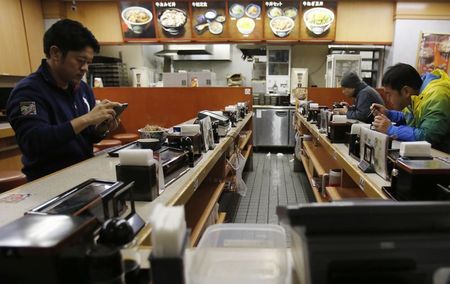By Leika Kihara and Tetsushi Kajimoto TOKYO (Reuters) - Japan's economy shrank an annualised 1.6 percent in July-September, confounding expectations for a modest rebound after a severe contraction in the previous quarter and solidifying the view premier Shinzo Abe will delay a second sales tax hike next year.
Abe has said Monday's GDP data would be key to his decision on whether to proceed with the increase to 10 percent in October next year. That decision had been expected by year-end.
The second straight quarter of contraction, which compared with a 2.1 percent increase forecast in a Reuters poll, added to signs the world's third-largest economy has been slow in healing from the blow to consumption from the first tax increase in April.
The April tax hike to 8 percent from 5 percent led to a revised 7.3 percent economic contraction in the second quarter, which was the biggest decline since the global financial crisis.
Given the prolonged pain from the April hike, an official close to the premier has told Reuters that Abe would postpone the second increase and call a general election in an effort to lock in his grip on power.
Abe, who is returning on Monday from a week-long tour to attend a host of global meetings in Beijing to Australia, is set to make a decision this week, Japanese media have said.
On a quarter-on-quarter basis, the economy fell 0.4 percent in the third quarter after a revised 1.9 percent decrease in April-June. Economists had expected growth of 0.5 percent.
Private consumption, which accounts for about 60 percent of the economy, rose a less-than-expected 0.4 percent from the previous quarter, as the April tax increase and unusually cold summer weather hurt households' spending.
Capital expenditure fell 0.2 percent, against a median market forecast of a 0.9 percent increase.
The lack of a pick-up in exports and the prolonged drag from the April tax increase on consumption have dashed policymakers' hopes that the economy would rebound strongly in July-September and head for a moderate recovery.

Sluggish economic growth and downward pressure on prices from recent global oil price declines prompted the Bank of Japan to expand its massive monetary stimulus last month.
(Additional reporting by Kaori Kaneko; Editing by Kim Coghill)
